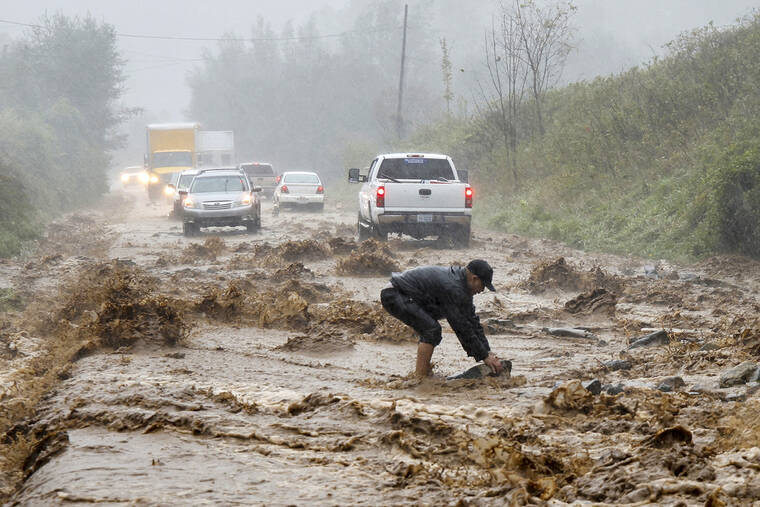‘This is a disaster’: Western North Carolina reels from Helene
ASHEVILLE, N.C. — Abandoned vehicles caked with mud. Mountainous rural roads and slices of highways washed away into rivers. Parking lots filled with people desperately searching for cellphone service, trying to tell loved ones they are OK — or wanting to find out who is not.
The remnants of Hurricane Helene that thrashed western North Carolina on Friday with powerful winds and cascades of rainfall have brought destruction and a sense of being under siege to the region known for its bountiful forests and blue horizon of jagged mountains.
ADVERTISING
Snapshots of the storm’s calamitous effect roughly 400 miles from where it made landfall in Florida were clear Saturday afternoon: People chain sawed their way to loved ones and drove for hours on dwindling gas tanks in search of food and power.
Also unnerving was the silence in the aftermath of the storm because of a lack of cellphone service, especially in Asheville, North Carolina, a rapidly growing city that draws legions of outdoors enthusiasts who cherish its hilly and tree-covered landscape, and relaxed, artsy vibe. Many people congregated in the few pockets of the city where a bar of service could be detected.
Christie Kafka, 52, had tried to flee Asheville on Friday for Charleston, South Carolina, but standstill traffic and side roads blocked by landslides made her and her husband turn back to downtown Asheville, where a crowd looking for cell service had gathered at a fire station.
They left again through a different route that night, but their car was running out of fuel, and few gas stations had power or were open.
“A chaotic mess,” Kafka said Saturday from Charleston, which the couple eventually reached at 3 a.m. They fear they’ll find her husband’s photography studio in Asheville’s River Arts District flooded when they return.
Even without a full picture of the damage, local and state authorities described the situation as a historic crisis. Drivers who had risked venturing out west of Raleigh, North Carolina, on Friday and Saturday were met with a warning flashing at several points along interstates: “Do not travel to western N.C.”
“We are in the midst of the most significant natural disaster in our community,” said Avril Pinder, manager of Buncombe County, which includes Asheville. Cell towers and Wi-Fi were knocked out, many roads were blocked, and some residents had no access to water, she said.
Gov. Roy Cooper of North Carolina said Saturday that more than 200 people had been rescued from floodwaters in the state. It’s unclear how many in North Carolina died in the storm and floods, but across the nation, Helene has claimed at least 52 lives. Officials said they would not provide details until they could inform family members — a task made difficult by the communications problems.
Getting supplies, food and water to the region has been an extraordinary challenge. Aaron Moody, a spokesperson for the North Carolina Department of Transportation, said in an email that “the damage is so severe, we are telling drivers that unless it is an emergency, all roads in western North Carolina should be considered closed.” The closures, more than 400 roads across the state, included multiple parts of interstates 40 and 26 around Asheville.
“There’s houses that have been cut off that we have not even been able to get to, because of mudslides and the rivers,” said Taylor Jones, emergency services director for Buncombe County, where small mountain towns ring the city of Asheville.
Gretchen Hogan, 42, who lives in Brevard, North Carolina, a town of about 7,500 people south of Asheville, said that a small creek near her home “turned into a raging river and wiped out both roads into our neighborhood.”
She used a chain saw to cut through downed trees and reach her parents’ home in an even smaller town nearby, where they were without power or any means of communication. “It’s like a mini-apocalypse,” Hogan said.
In Vilas, about 90 miles northeast of Asheville, Steve Hicks said that he had been separated from his family by a gap on a road and couldn’t reach them by phone. He parked his car on one side and scrambled down to the creek, which he crossed by foot and climbed up the other side.
“That was a biblical storm,” said Hicks, who eventually reached his family.
Alan Ward, 53, of Fairview, North Carolina, about 10 miles southeast of Asheville, said his daughter had tried unsuccessfully to call him 32 times Friday night to find out how he was. “This is so frustrating,” he said.
The lack of communications left many residents uncertain about the safety of their families and friends. Officials urged people not to go out, saying that the ground was still wet and flooding could trigger more mudslides.
Some people who could get out of the mountain towns headed for Shelby, North Carolina, about halfway between Asheville and Charlotte. Lines of cars extended onto the streets around gas stations; most pumps had run dry by Saturday morning.
“This just hit us like a hellstorm,” said Darrell Thomas, 49, who lives near Asheville. He drove nearly two hours to find a place with food and power. “I can’t take another night of just eating packaged doughnuts and mixed nuts,” he said.
Thomas said that it took him four hours to get back home Friday night because of the number of impassable roads. He had considered sleeping in his pickup truck, he said. But when he saw a man remove the cones blocking an interstate, he and a line of drivers in front of him charged ahead, Thomas said.
The rain had caused a river to rise onto the interstate, turning it into a raging stream that had already swept up smaller vehicles that appeared to have been abandoned. Mucky water sloshed by the side of Thomas’ truck, as if he were steering an amphibious vehicle.
“We rolled through,” Thomas said, praying the water would not reach his exhaust.
In Shelby, nearly all of the traffic lights were out Saturday morning. The few fast-food chains that remained open were filled with people. A Walmart supermarket was closed.
At a Dollar General, Susan Thompson, 66, said she had no power at her house and barely enough gas to make it to the store for some canned meals.
“This is a disaster,” she said.
This article originally appeared in The New York Times.
© 2024 The New York Times Company





